INTRODUCTION
South Africa boasts a centuries-old wine heritage that dates back to the 17th century when Dutch settlers first planted vineyards in the Cape. Over time, this industry has evolved, gaining recognition for the distinctive characteristics of its unique terroir, and the exceptional quality produced by some of the world’s most passionate and knowledgeable winemakers. Recent years have seen a remarkable uptick in the consumption and appreciation of South African wines in the American wine scene. In this article we’ll explore some of South Africa’s wine history, what makes it so unique, and how it is being received by American audiences.

HISTORY OF SOUTH AFRICAN WINE
South African winegrowing dates back to the late 17th century when Dutch settlers, primarily from the Dutch East India Company, established vineyards in the Cape Colony. Jan van Riebeeck, a Dutch colonial administrator, planted the first vineyard in 1655 to produce wine for sailors on their long sea voyages. He famously made a diary entry that allows South Africa the unique privilege of knowing the day their Wine Industry was born. On February 2nd, 1659 he wrote:
“Today, praise be to God, wine was made for the first time from Cape grapes.“
However, it wasn’t until the late 18th century that the wine industry began to flourish, with the arrival of French Huguenot refugees bringing winemaking expertise and introducing new grape varieties including Chenin Blanc (also known as Steen in South Africa), as well as Muscat, Sémillon, and several red grape varieties like Cabernet Sauvignon, Merlot, and Shiraz (Syrah). These varieties significantly contributed to the diversity and quality of wines produced in South Africa, shaping the country’s winemaking landscape into what it is today.

Over the years, South Africa’s wine industry has faced various challenges, including phylloxera outbreaks (a small, aphid-like insect), apartheid-related sanctions, and economic fluctuations. From its humble beginnings under Dutch and French influence to overcoming challenges during apartheid, the industry has persevered. Today, it stands as a testament to resilience and craftsmanship, producing world-class wines that reflect its unique terroir and winemaking expertise.
UNIQUE CHARACTERISTICS OF SOUTH AFRICAN WINE
What sets South African wines apart is their diversity. Winemakers in South Africa aren’t bound by many strict rules so they are able to experiment and have fun with their wines. The country’s varied climate and terroir have led to the cultivation of a wide array of grape varietals across different wine regions, so from the robust reds of Stellenbosch to the crisp whites of Constantia, each wine tells the story of the land it comes from.
Another, and arguably the main distinguishing factor is that the soils of the Cape Winelands are some of the most ancient in the world, created around one billion years ago when the continent of Africa was formed.
This ancient soil is a challenge to grow in, but yields exceptional wines that cannot be recreated in the newer earth found in other wine regions around the world. A fantastic example of a winery who champions their uniquely ancient soil is Vilafonté, a low-yield vineyard who’s award-winning Bordeaux-style blend, Seriously Old Dirt, is making waves in the wine world for all the right reasons.
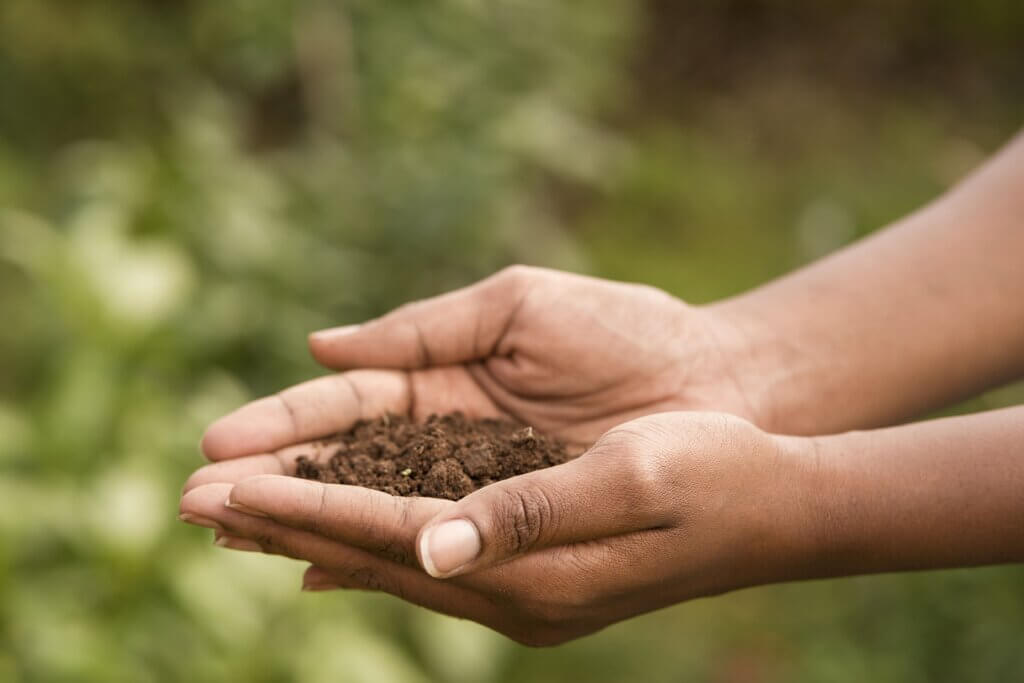
FACTORS CONTRIBUTING TO THE POPULARITY OF SOUTH AFRICAN WINES IN AMERICA
The increasing popularity of South African wines in America can be attributed to several factors. The consistent quality of these wines coupled with international recognition and awards has piqued the interest of consumers. Tourism has also played a large role, with over 35,000 Americans visiting South Africa’s sundrenched shores every year, many of whom are exposed for the first time to the joys of South African wines. Furthermore, strategic marketing campaigns and partnerships with distributors such as Cape Ardor have expanded their presence in the market.

SOUTH AFRICAN WINE TRENDS IN THE US MARKET
Consumer preferences have evolved, favoring the uniqueness and authenticity offered by South African wines. Sommeliers and wine critics have played a pivotal role in promoting these wines, influencing trends and encouraging exploration among wine enthusiasts. But despite its exceptional quality and good value to the American consumer, South African wine still has a long way to go before it becomes a regular feature in American cellars.
HOW MUCH SOUTH AFRICAN WINE DOES THE USA IMPORT?
According to data from the International Organization of Vine and Wine, South Africa ranks eighth among the biggest wine producing countries in the world, producing 10.2mhl (million hectoliters) per year. South Africa also ranks sixth in countries that export the most wine, with the USA being the top importer of wine at 14.49mhl per year in total. So how much South African wine does the USA import?
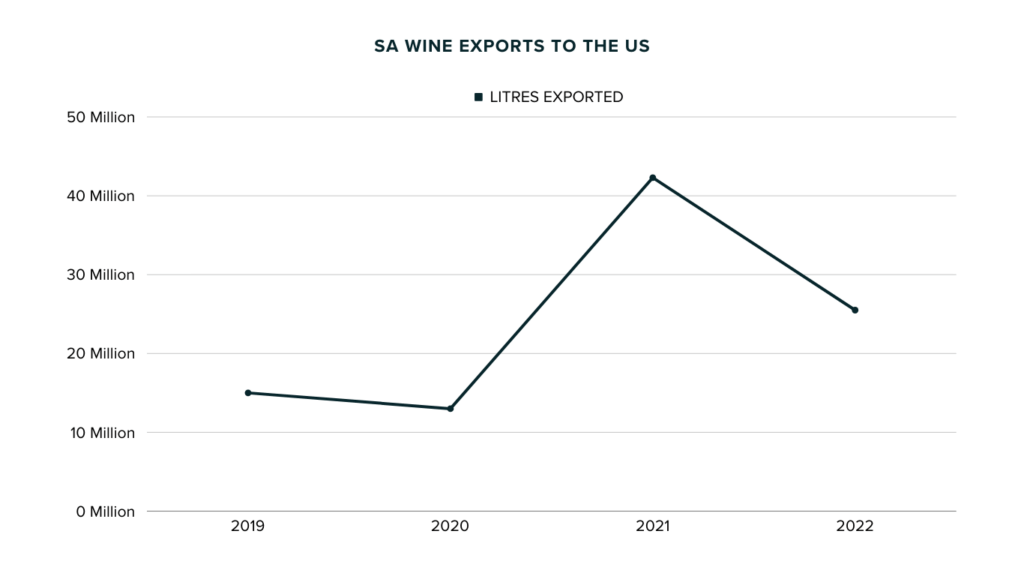
South African wines, like all exports, saw a dramatic dip in 2020, followed by a massive year in 2021 to compensate. In 2022 they stabilized at a high base, exporting 25.5 million liters.
WHICH COUNTRIES IMPORT THE MOST SOUTH AFRICAN WINE?
As of 2022, the USA ranks 4th in importers of South African wines at 25.5 million liters including bulk wine imports. It is interesting to note, however, that the USA are the world’s largest consumer of wine by a significant margin. As boutique South African wines gain favor with American wine lovers, there is potential for South African wines to expand their market share in the coming years.
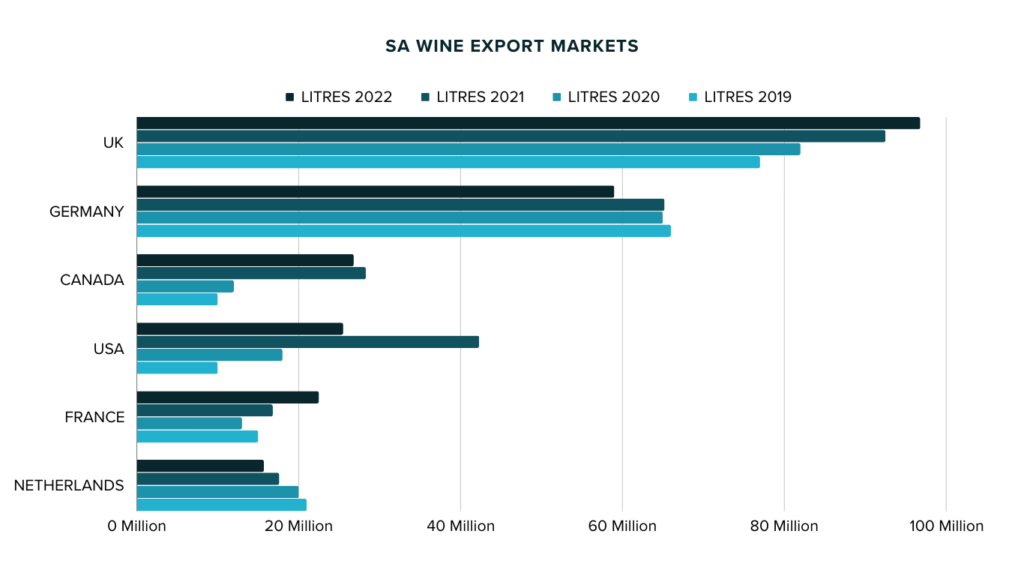
CHALLENGES FACED BY THE SOUTH AFRICAN WINE INDUSTRY
Despite its growth, the South African wine industry encounters challenges in the global market. Export barriers, regulatory hurdles, and fierce competition pose obstacles to sustained growth and market penetration in America. For a select few dialed-in wine experts, it is widely accepted that the South African wine industry is experiencing a golden-age and producing some of the most exciting and delicious wines in the world. How long it will take for this to trickle down to the US at large and encourage them to sample this unique terroir, remains to be seen.
SUSTAINABILITY AND ETHICAL WINEGROWING PRACTICES
Like much of the world, South Africa has placed growing emphasis on sustainability and ethical winemaking in recent years. South African wineries were among the first in the world to adopt environmentally friendly approaches such as biodynamic and sustainable practices in their winegrowing. These methods not only align with consumer values but also contribute to a positive brand image and expansion into a market which is increasingly eco-conscious.
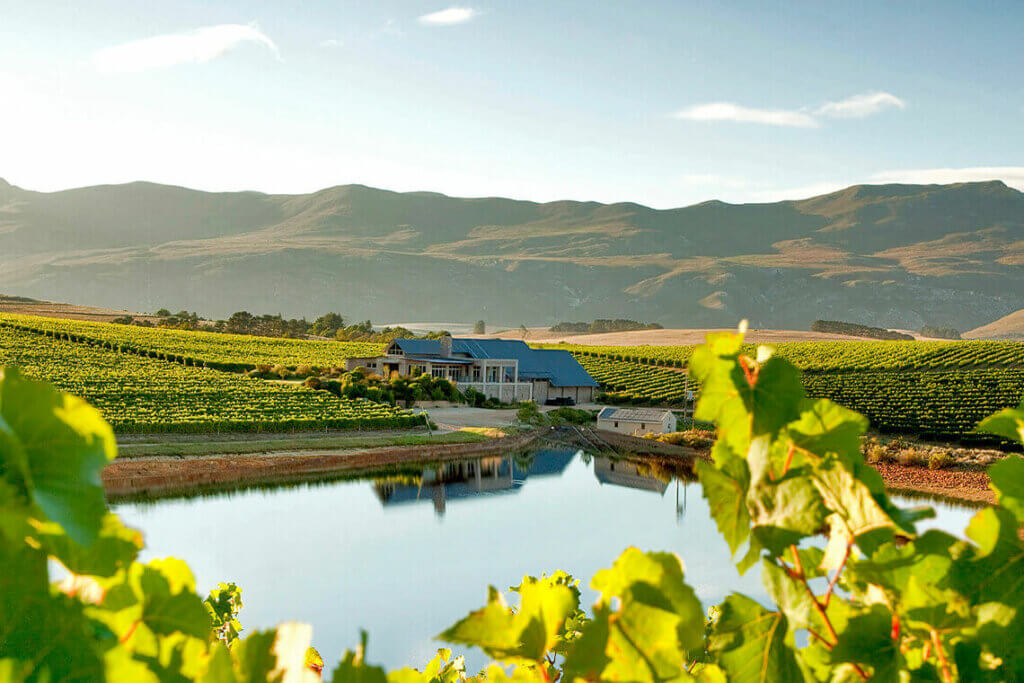
NOTABLE SOUTH AFRICAN WINE PRODUCERS
Several renowned wineries in South Africa have gained prominence in America due to their exceptional wines. From the iconic estates of the Cape Winelands to emerging boutique producers, these wineries have contributed significantly to the country’s wine reputation in the U.S., earning countless international awards across a number of varietals.
Explore top South African wineries here.
PAIRING SOUTH AFRICAN WINES WITH AMERICAN CUISINE
South African wines offer a perfect complement to a wide range of American dishes. We’ve included some of our favorite combinations below:
Pinotage – Pepperoni pizza, hearty beef stew or rich mushroom risotto
Chardonnay – Cheese or pesto based pastas, creamy chicken or fish or fresh vegetable dishes
Shiraz – Grills and barbecue, hamburgers and blue cheese
Sauvignon Blanc – Salads, seafood, fresh fish like salmon, sushi and fresh vegetable dishes
Cabernet Franc – Roasted pork, beef burgers, tomato based pastas and beef stews
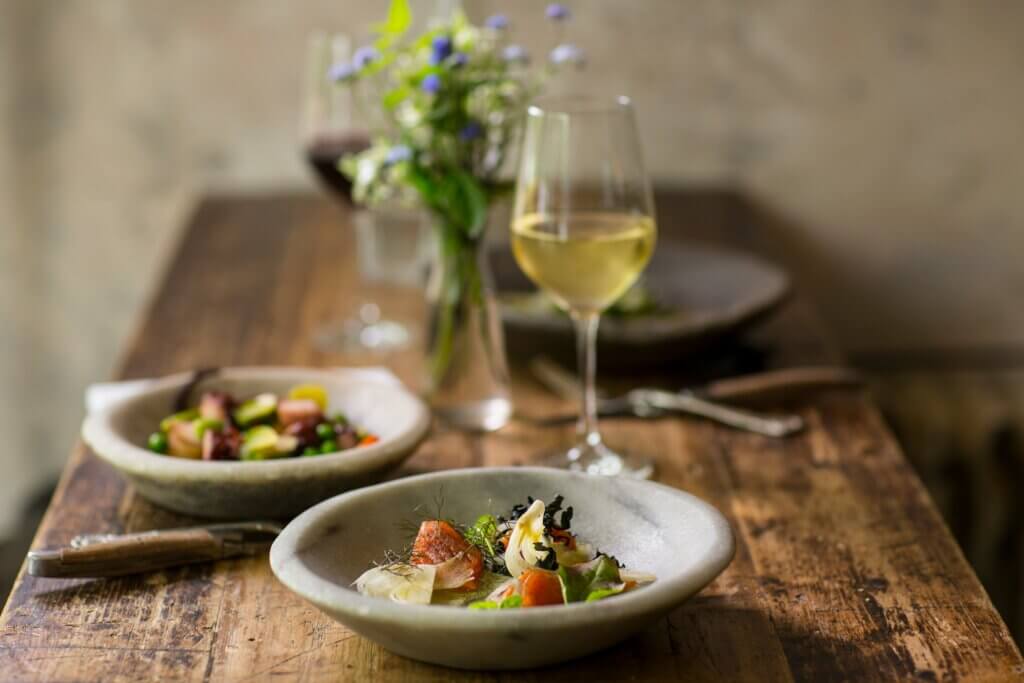
FUTURE OUTLOOK
The future of South African wines in the American market looks promising. With ongoing innovations, a focus on sustainability, and continued efforts to meet consumer demands, the industry is poised for further growth and acceptance.
CONCLUSION
In conclusion, the growing popularity of South African wines in America indicates a shift in consumer preferences towards unique and high-quality wines. As these wines continue to captivate palates and gain recognition, there’s an invitation for wine enthusiasts to go off the beaten path and explore the many diverse offerings from South Africa. Wine-lovers in the United States can surely look forward to increased availability of these phenomenal South African wines in the next few years. Now that’s something we can toast to!
If you want to learn more about South African wines or are curious about what varietals or brands you’d enjoy the most, feel free to contact us on +888 812 2543 or fill out this form and our friendly team of wine geeks will get back to you to find your perfect fit.
FAQs
Q: What makes South African wines unique compared to other regions?
A: South African wines offer diversity in grape varietals and terroir, are less restricted by rules than other winegrowing countries, and are grown in some of the world’s most ancient soils, resulting in a wide range of flavors and styles not found elsewhere.
Q: How can I find South African wines in the American market?
A: Some liquor stores carry a selection of South African wines. Additionally, wine bars and restaurants often feature them on their menus. The most reliable way to find curated, high quality South African wines is by shopping through a trusted online retailer like Cape Ardor.
Q: Are South African wines affordable?
A: Yes, there’s a broad range of prices for South African wines, catering to various budgets. Some offer exceptional value for their quality. Even ultra-premium South African wines offer excellent value relative to their world-class quality.
Q: Which South African wine regions are most renowned?
A: Stellenbosch, Constantia, Paarl, Franschhoek (French corner), Hemel en Aarde, and Elgin are among the best-known wine regions in South Africa. They are internationally acclaimed for producing exceptional wines.
Q: Can South African wines age well?
A: Yes, many South African wines, especially certain red varietals like Cabernet Sauvignon and Shiraz, have aging potential and can develop beautifully over time.



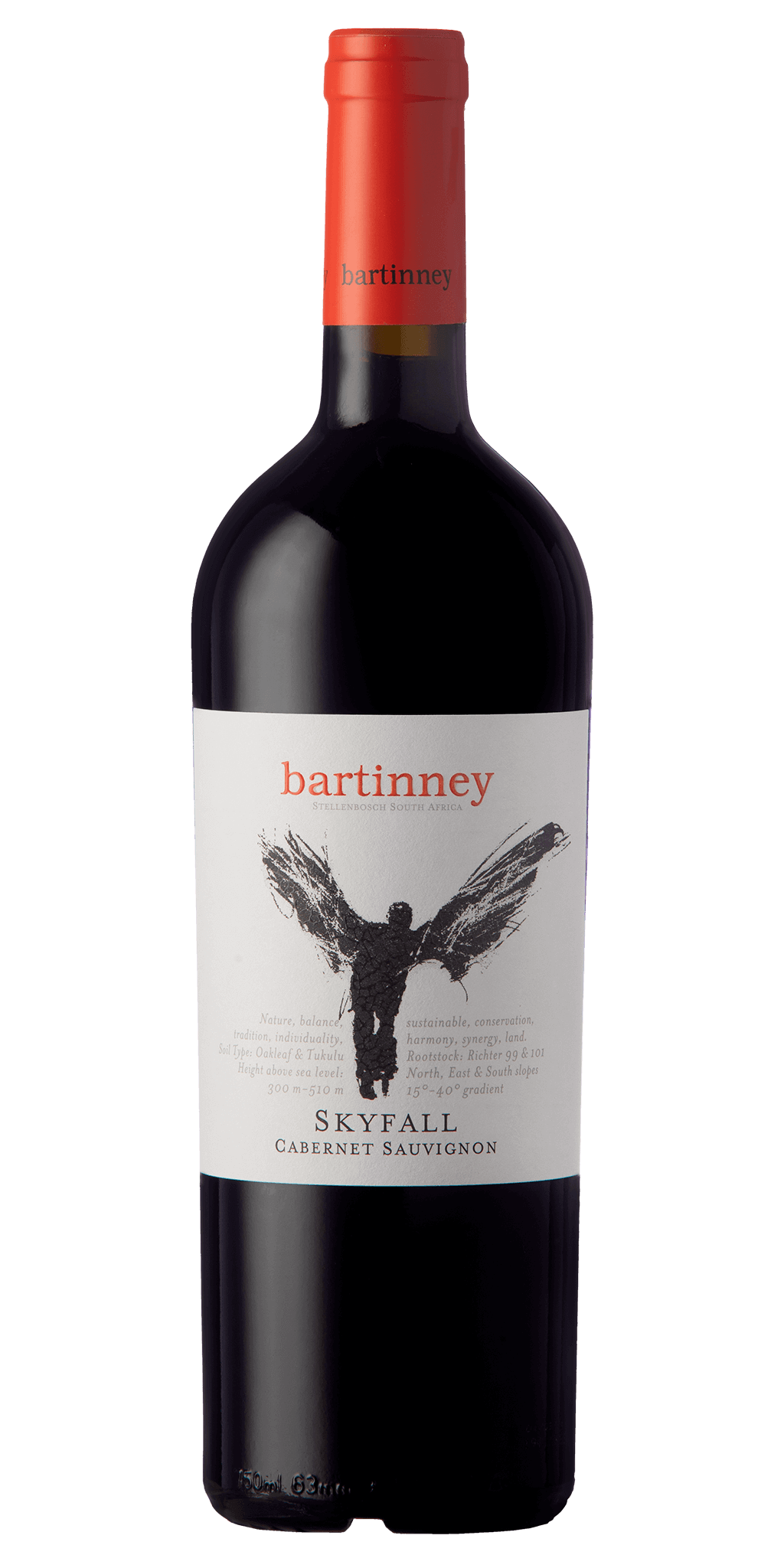
 +1 888 812 2543
+1 888 812 2543